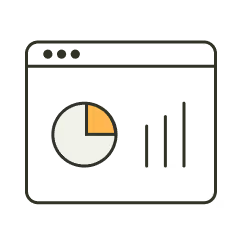Term Life Insurance Canada: Coverage, Cost & How It Works
Your family deserves term life coverage as reliable as you are. Get an online quote in just a few clicks.
How does term life insurance work?
Term life insurance is a type of policy that covers you for a set period of time (the term length). Like most Canadians, you probably have one or more of the following: debts, a mortgage, kids, a spouse who depends on your income, or other financial obligations that would go unmet if you were to pass away suddenly.
A term life insurance policy allows you to make sure those obligations and dependents will be covered if you die. With a term life insurance plan, you pay insurance premiums to a life insurance company for a certain number of years, known as your policy term. If you die during that period of time, your insurance provider pays out a single tax-free, lump-sum death benefit to your beneficiaries (i.e. the loved ones you name in your policy).
That’s it: You pay for peace of mind, and your insurance company agrees to step in with a financial safety net if you die before your term ends.

How much does term life insurance costin Canada?
Term life insurance is the least expensive life insurance product available. PolicyMe’s streamlined digital application process uses technology to cut out unnecessary underwriting costs and keep your quotes tailored to your real-world needs, making your premiums even more affordable.
The table below is designed to give you a general picture of what you might pay for a term life insurance policy — but keep in mind that your term length, coverage amount, gender, health status and other factors can all impact your final quote.
Age | Premiums For Women | Premiums For Men |
|---|---|---|
30 | $20.68 | $29.67 |
35 | $22.93 | $31.29 |
40 | $33.27 | $44.96 |
45 | $51.25 | $71.49 |
* Average term life insurance premiums for non-smokers with $500,000 in coverage for a 20-year term, rates as of December 2025.
See your rate with 5 easy questions!
How much term life insurance do I need?
Insurance may not feel like the most personal financial product — but building a term life insurance policy can be extremely personal. Your term life insurance coverage should line up with your financial goals and needs.
Everyone’s insurance needs are different. To estimate yours, you’ll need to think about your financial obligations, how long you expect them to last, and how much money your loved ones would need to cover them if you died.

As a single mother, Maya is solely responsible for her son’s well being and wants to make sure he is financially stable if she’s no longer there to provide for him. She chose coverage that will help provide for his living costs and education expenses, securing his financial future.
Coverage: $600,000
Term: 20 years
Rate: $42.80/month

Emma and David recently became new parents—and with a little one now depending on them, they knew it was time to think about her future. They wanted coverage that would give their family financial security, replacing lost income and ensuring their daughter would always be cared for.
Emma's Policy Details:
Coverage: $750,000
Term: 25 years
Rate: $51.25/month
David's Policy Details:
Coverage: $750,000
Term: 25 years
Rate: $69.35/month

Mark is newly married and wants to ensure that his wife is financially secure if something unexpected happens to him. He knows that waiting to get coverage means he’ll pay more (or even be denied), so he purchased term coverage while he’s young and healthy to lock in the most affordable rates.
Coverage: $500,000
Term: 30 years
Rate: $46.76/month
How to choose a term length
To choose your term length, think about how long your major financial obligations will last. If you expect to pay off any significant debts in the next decade and don’t have any dependents, a 10-year term might be best for you. Or, if you have young kids, a longer term might be a better fit.
To give you an idea of what you might need, the most commonly purchased term length from PolicyMe is a 20-year term.
May be best for short-term debts, smaller financial obligations, and people close to retirement
May be best for young families and new homeowners
May be best for long-term financial obligations, expecting parents or people early in their professional career
How to choose a term life coverage amount
When it comes to the amount of coverage you need, add up the total of your outstanding debts, mortgage payments, childcare and education costs, and annual income (multiplied by the number of years in your chosen term). But don’t just stop there — think about other expenses you may want your life insurance to cover, such as:
- Kids’ extracurricular activities (e.g. summer camp, art classes, or sports)
- Retirement savings
- End-of-life and funeral costs
- Supplemental everyday expenses
- College tuition for your kids
Working with a trusted insurance advisor may help you feel confident that your policy is meeting all your financial needs. You can also use our online life insurance calculator as a simple starting place to get an idea of the ballpark amount of coverage you’re looking for.

Talk to our experts
Schedule your appointment or call us anytime Monday to Friday at Call +1 (866) 999-7457 from 9AM-5PM EST Monday to Friday or book a call with our team of Canadian insurance advisors. We're always happy to help! Or send us an email:
General inquiries: info@policyme.com
Existing customers: advisor@policyme.com
Claims: servicing@policyme.com

Why term is the best choice for most Canadians
You can buy a permanent life insurance policy that covers your entire lifetime, but we believe that term life insurance is best suited for the average Canadian's needs. Here’s why:
Most people only have major financial obligations during a certain period of their life (e.g. when their children are young or they’re still paying off a mortgage).
Because most term life insurance policyholders will outlive their policy term, insurers don’t overcharge for it. This coverage is the most affordable way to protect your loved ones’ financial future without overpaying for coverage you don’t need.
By opting for the most affordable life insurance option, you can use the savings to invest, save for retirement or your children’s education, or meet more basic, short-term needs.
Many Canadians think they already have sufficient life insurance through an employer-sponsored group plan, but these plans usually don’t have the right amount of coverage for your family’s unique needs.
Term life insurance vs whole life insurance
Term life insurance is a temporary financial product that covers a vulnerable period of your life. It’s an affordable, straightforward way to meet specific, time-limited needs.
Whole life insurance extends past this critical period to cover your entire life, with a payout guaranteed whenever you die (as long as you keep up with payments). For high-net-worth individuals with complex estate planning needs, whole or universal life insurance may be a good option. But it’s considerably more expensive, often difficult to understand, and not a great fit for most Canadian families’ insurance needs.
Features | Whole | Term |
|---|---|---|
Who it's for Green Column Description | Best suited for those with high-net-worth with complex estate planning needs | Best suited for the average Canadian family |
Type of coverage Green Column Description | Permanent coverage | Coverage lasts as long as you need |
Average cost Green Column Description | Costs up to $150-$225 more than term | Starts at around $20-30 per month |
Policies Green Column Description | Comes with surrender fees, taxes and other restrictions | Policies are easy to understand, with little-to-no fine print |
Payout Green Column Description | Death benefit is tax-free, but beneficiaries are taxed on the policy’s interest | Your loved ones get a tax-free lump sum if you pass during your term |
Features | Whole life insurance | Term life insurance |
|---|---|---|
Cost Green Column Description | Premiums are more expensive than term life insurance. | Premiums can start at $20 to $30 per month. |
Policy length Green Column Description | Covers you for your entire life as long as you keep up the payments. | Covers you for a specific period, typically 10, 20 or 30 years. |
Cash value Green Column Description | Accumulates cash value over time. | Doesn’t accumulate cash value. |
Investment Green Column Description | Investment component that helps the policy build cash value over time. | No investment component. |
Premiums Green Column Description | Usually fixed for the life of the policy. | Usually fixed for the entire term and increase on renewal. |
Flexibility Green Column Description | Potential to use as collateral for loans. | Can be renewed or, at times, converted to permanent life insurance. |
Benefits Green Column Description | Tax-free lump sum payment to beneficiaries. Can pay out dividends. | Tax-free lump sum payment to beneficiaries. |
Best for Green Column Description | High-net-worth Canadians or those with permanent dependents. | The average family with short-term responsibilities: mortgage, minor kids etc. |
Features | Mortgage insurance | Term life insurance for mortgage |
|---|---|---|
What it's for Only used for paying off the remainder of the mortgage balance. | Only used for paying off the remainder of the mortgage balance. | Financially protecting your family in any way they need. (Example: mortgage, childcare, tuition, time off, etc.) |
Average cost per month $73.10 / month* | $73.10 / month* | $32.85 / month* |
Level premiums Subject to change | Subject to change | Yes |
Pros
|
|
|
Cons
|
|
|
Features | Whole | Term |
|---|---|---|
Who it's for Green Column Description | Best suited for those with high-net-worth with complex estate planning needs | Best suited for the average Canadian family |
Type of coverage Green Column Description | Permanent coverage | Coverage lasts as long as you need |
Average cost Green Column Description | Costs up to 7.5x more than term | Starts at around $20-30 per month |
Policies Green Column Description | Comes with surrender fees, taxes and other restrictions | Policies are easy to understand, with little-to-no fine print |
Payout Green Column Description | Death benefit is tax-free, but beneficiaries are taxed on the policy’s interest | Your loved ones get a tax-free lump sum if you pass during your term |
Option to convert or renew policy Green Column Description | No | Yes |
Cash value Green Column Description | Builds cash value, option to withdraw as a loan | No cash value |
Rate of return Green Column Description | ~3.5% (compare to roughly 4.8% from the stock market or 8.5% from index funds) | None. Save with term and put the difference in traditional investment vehicles |
Features | Life Insurance Through Work | PolicyMe Insurance |
|---|---|---|
Policyholder Green Column Description | Your employer | You |
Coverage amount Green Column Description | 1-2x your salary | Apply for between $100,000 to $5 million, personalized to your family's needs |
Coverage length Green Column Description | As long as you're working at the company | Policies from 10-30 years, personalized to your family's needs |
Keep your coverage if you change jobs? Green Column Description | Not Included | Yes |
Medical Exam? Green Column Description | Not required | Not required in most cases |
Why PolicyMe is the top-rated life insurance in Canada
PolicyMe has the top-rated term life insurance coverage in Canada for one simple reason. We use technology to cut out unnecessary fluff from the application and underwriting process to deliver affordable insurance coverage with the same quality and reliability other insurers offer.
- Multiple term life insurance coverage options: 10, 15, 20, 25, or 30-year terms
- 20-year term policies start as low as $23/month
- Option to convert to permanent life insurance
- Fully digital application process with instant approval for most Canadian
- No medical exam needed for most applicants
- Policies backed by Securian Canada and Assuris for maximum financial security
- Health & dental and critical illness insurance are also available
Same coverage, same peace of mind — with lower premiums and fewer headaches.
.avif)
Join the 30,000+ Canadian families who sleep better at night.
Decades of trust behind us, peace of mind ahead for you.

12,000+ Canadian families protected (and counting)
$10 billion in coverage provided

4.8/5 stars from families who thought insurance would be much harder
Ready to get started on your own terms? Get a free quote
FAQ: Term life insurance Canada
We’re big believers in keeping things simple, so ask us anything and we’ll answer honestly and without the jargon.
Term life insurance is a temporary life insurance product that offers a single lump-sum payout in the event of the policyholder’s death prior to the end of a specific term. In plain English, term life insurance is an affordable way to make sure that your loved ones will receive financial assistance that meets their real-world needs if you die while your chosen policy is active. It’s different from other types of life insurance, such as whole or universal life insurance, in that it only covers a specific period of years rather than the policyholder’s entire life.
For most Canadians with major financial obligations, like children or mortgage debt, term life insurance is worth the minor expense. While most term life policies don’t end up paying out, the low cost of this type of life insurance means your loved ones will be covered against serious financial hardship during the most vulnerable period of your lives — without adding to the household’s financial burdens.
Term life insurance covers your beneficiaries’ financial needs in the event of your death during the policy term. There’s no universal standard payout for term life insurance — in order to make sure that all of your loved one’s needs are covered, you’ll need to calculate the expenses they would need to cover and the income they would lose if you passed away.
Permanent life insurance covers the policyholder’s entire life with a payout to beneficiaries regardless of when they die. This type of life insurance often includes a cash value or investment component that builds value during the life of the policy. Term life insurance only offers coverage and potential payouts if the policyholder dies during the selected term, and there’s no cash value component. For most Canadians, term life insurance is a better fit for real-world needs.
No, there’s no cash value or investment component to a term life insurance policy. While that may seem like a disadvantage if you’re trying to maximize your investments, the reality is that life insurance isn’t a great investment tool. By opting for a term life insurance policy with low premiums rather than a permanent plan with a cash value component, you’ll free up your finances to invest the difference in cost elsewhere with a better return on your investment.
Yes, you can cancel term life insurance. With PolicyMe, there’s no fee or penalty if you choose to cancel your policy.
At the end of your term life policy, you may have the option to renew your coverage or convert a term policy to a permanent life insurance policy. If you don’t choose either of these options, or if they’re not available, your coverage will end. Unless you purchased a return-of-premium (ROP) rider, you won’t get your premiums back and there will be no payout from your policy.
Have a question we didn’t answer?
Call +1 (866) 999-7457 from 9AM-5PM EST Monday to Friday or email us. Our insurance expert team is happy to help!

Read next: life insurance quotes & beyond
About PolicyMe term life insurance
PolicyMe is a Canadian digital insurance solution that makes financial protection for families simple and affordable. It was founded by two insurance consultants, Andrew Ostro and Laura McKay, and an experienced Chief Technology Officer, Jeff McKay. PolicyMe has partnered with Securian Canada, a Fortune 500 company Securian Financial subsidiary.

